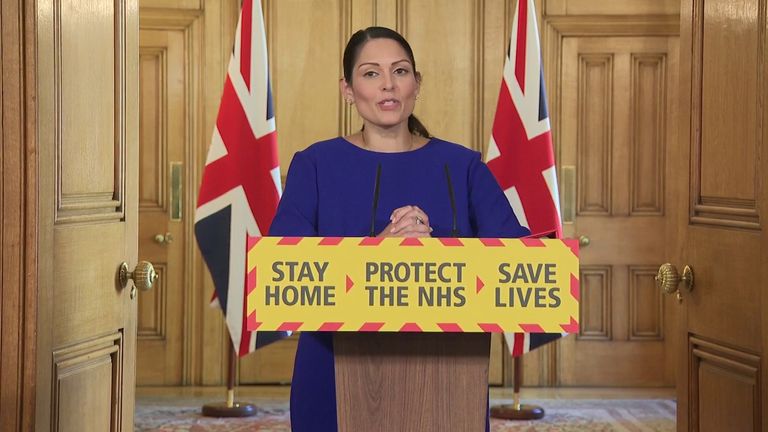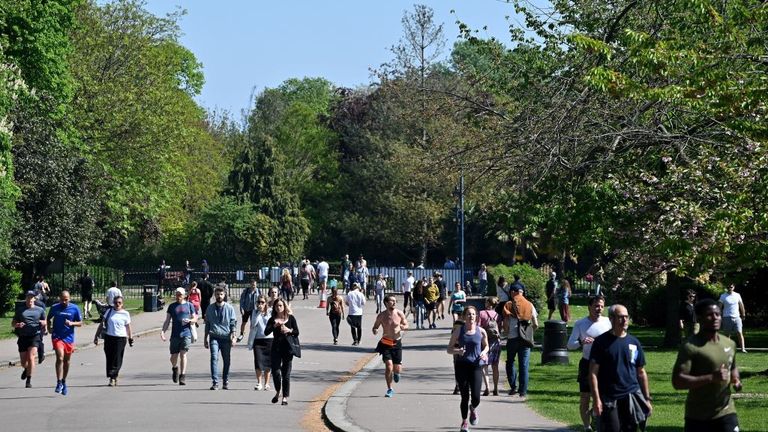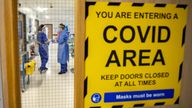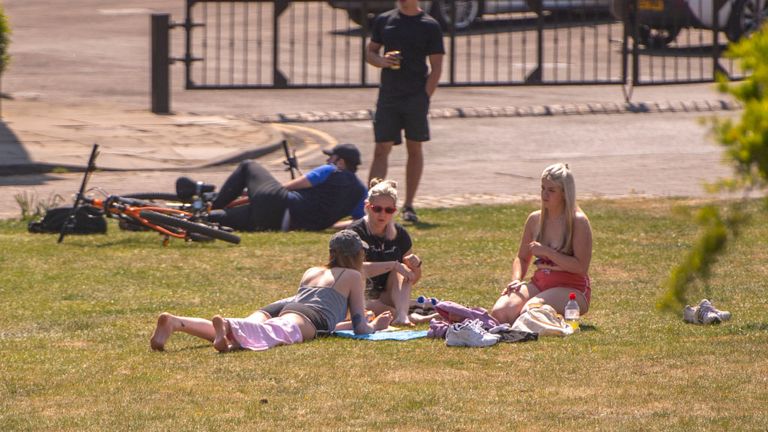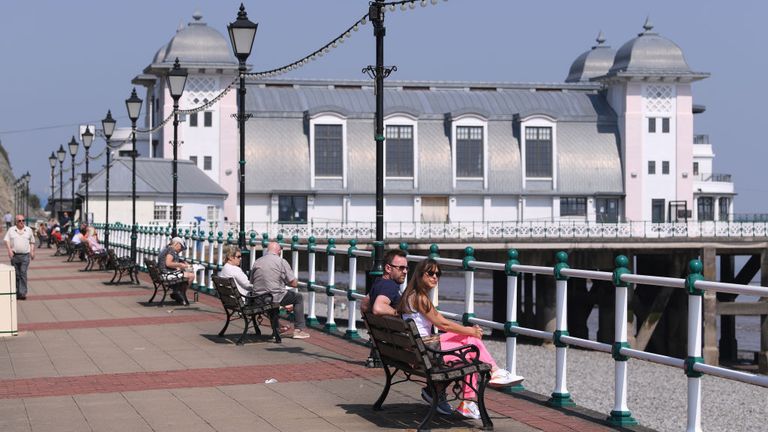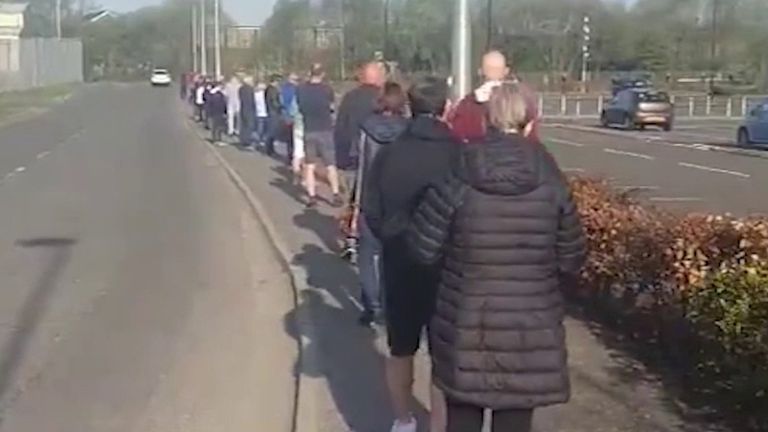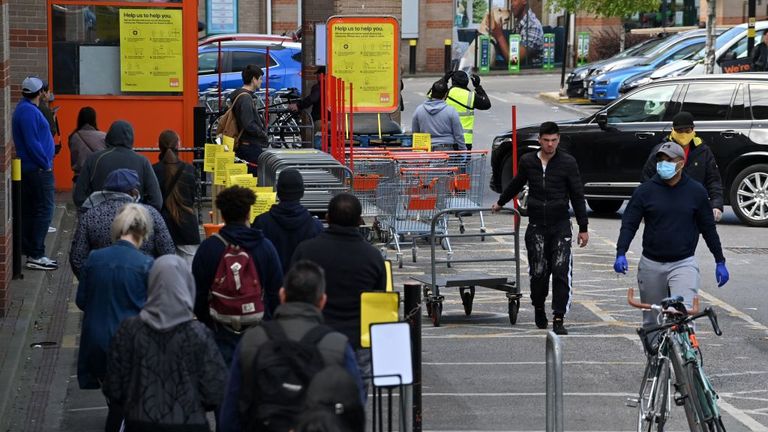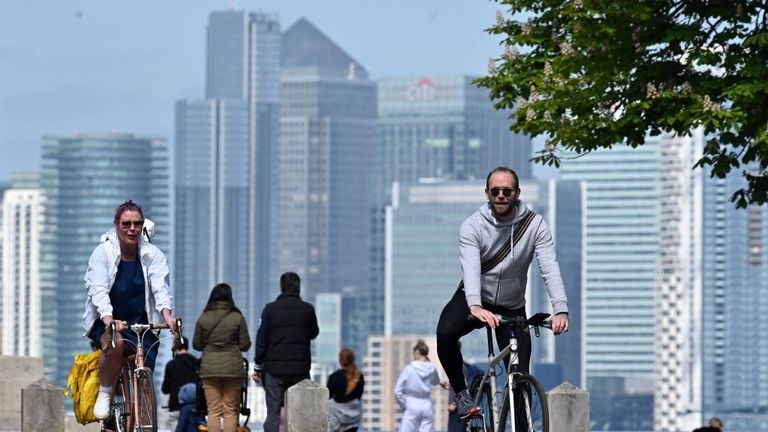Coronavirus: Government giving out mixed messages over lockdown, says Met Police Federation
The association calls for "clear and unambiguous laws, guidance and communication" around what people "can and can't do".
Saturday 25 April 2020 21:03, UK
The Metropolitan Police Federation, which represents officers in London, has accused the government of giving out mixed messages to the public over the coronavirus lockdown.
The association has called for "clear and unambiguous laws, guidance and communication" from ministers around what people "can and can't do".
It comes just hours after the home secretary claimed the government's message "has been clear and consistent from day one" as she led the daily Downing Street coronavirus news briefing on tackling the pandemic.
Priti Patel insisted "there are no mixed messages", adding that people must follow the rules or face law enforcement as data shows more people are on the move.
The warm weather on the fifth weekend of lockdown has fuelled fears people will venture out and flout the rules, while there have been long queues outside B&Q stores this week, with safety measures in place.
Ken Marsh, chairman of the Metropolitan Police Federation, said: "Contrary to the view we heard today from Downing Street, the Metropolitan Police Federation does believe there are mixed messages coming out from the government around the lockdown for the public.
"This makes our already difficult job of policing this unprecedented crisis harder.
"We have to ask whether DIY stores - for instance - are essential stores for the public to attend? Their opening creates increased footfall and vehicles on our roads which surely goes against what we have been told around people staying home to protect the NHS and save lives."
Mr Marsh added: "Police officers are on the front line of combating the coronavirus crisis - we need clear and unambiguous laws, guidance and communication from government around what the public can and can't do. What is essential and what isn't.
"If officers are confused about all this then so will the public be."
Ms Patel earlier warned the public that frustration and desperation to return to normal life are not good enough reasons to lift the lockdown and the UK is not out of danger yet.
As the country enjoyed sunny weather above 20C in many regions, the home secretary said data shows the number of journeys continues to rise but that people must respect the rules - and she insisted the government's message is clear.
"We understand the frustration," she said, adding: "Staying at home and enforcing social distancing is absolutely vital."
Ms Patel said "we all want to return to living our lives as soon as possible" but that five tests need to be met before lifting restrictions can be considered.
She said it would be "irresponsible" to offer a date when rules could be relaxed, saying: "The fact of the matter is, we want to prevent a second wave of this horrendous virus."
Echoing the message, director of NHS England Stephen Powis said: "The sun is out around the country, the days are getting longer, and I'm sure it's tempting for people to feel that they should go out."
But he added: "I can't emphasis enough that we are far from there yet...it won't take much for this virus to start increasing its transmission again and spread more widely."
He went on: "It would be foolish and not right if we lost the benefits that we have gained over the last four weeks, which I know have been hard for everybody, so it's really important that despite the weather, we stay at home, we keep to the guidelines that we've been issued with."
NHS England has reported another 711 COVID-19-related deaths, Wales a further 23 and Scotland 47 more. Northern Ireland has reported another 16 fatalities. The Department of Health says the overall number of deaths in hospitals has now reached 20,319.
The warm weather on the fifth weekend of lockdown has fuelled fears people will venture out and flout the rules, while there have been long queues outside B&Q stores this week, with safety measures in place.
This, coupled with data showing more people are on the move, has forced the government to deny mixed messaging.
One of the government's own advisers has said that while there is a difference between people using transport and breaking the rules, the messaging "urgently needs to be dealt with".
Susan Michie, professor of health psychology at University College London and a Whitehall adviser, told Sky News: "What we have seen this last week is many employers are opening up for business again and asking workers to come back to work and workers travel on transport.
"We must realise some people are responding to what they are being asked to do, they are not flouting the rules.
"I think it's very, very difficult when we are getting mixed messages from the government.
"On the one hand stay at home, on the other hand go into non-essential work."
To ensure continued adherence to the rules, Prof Michie stressed the need to provide people not just with clear messaging, but also with financial security and psychological support.
Meanwhile, it has been reported that people could be allowed to meet up with 10 of their closest family or friends under a future easing of the lockdown - similar to an idea already being discussed in Belgium.
It has also emerged that talks have been taking place between ministers and the Premier League on re-starting the football season once the government decides the conditions for relaxing the restrictions have been met.
:: Listen to the Daily podcast on Apple Podcasts, Google Podcasts, Spotify, Spreaker
